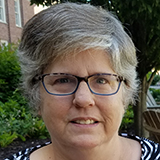Notice of Online Archive
This page is no longer being updated and remains online for informational and historical purposes only. The information is accurate as of the last page update.
For questions about page contents, contact the Communications Division.

visiting assistant professor of computer science
Ph.D., New Jersey Institute of Technology, computer information systems
What I’m focused on:
“I’m a computer information systems specialist, which means that rather than just focusing on the technical aspect of computer science, I’m focused on how people use computers. So I work with psychologists and sociologists and use theories from those fields as well as the computing sciences field.”
What inspired me:
“I was a math major. I had maybe one or two computer science courses, but when I graduated, I ended up being a programmer in an engineering firm. I was the only woman who was not an administrative assistant. It was a rather interesting environment, but I loved it. I absolutely loved it. It was like playing games all day. I became addicted. There were times where I stayed and worked all night. I’d just take a nap under the desk. This was the environment at the time. I got my masters and my MBA, and at 53 I went back for my Ph.D. I just love being in a learning environment. You’re never too old to learn.”
What I hope to do:
“I want my students to be system thinkers. In other words, when they approach a problem, I want them to think about what are the things that need to be solved in a broad fashion. So if you solve A, what is the impact on B, C, and D? That is necessary for critical thinking. I want them also to seek out information they don’t have. If there is something that they want to do and they don’t know how to do it, I want them to look and to find out the solution, so that they can learn to be self-sufficient programmers.”

What I’m holding:
“I am studying the use of social media during a crisis, and how emergency response agencies can make use of the data that the public posts. I’m looking mainly at the county level because that’s primarily where FEMA funding goes. And they are not using social media to its fullest potential. Some don’t collect any data at all from the public. So I’m investigating why so that we can hopefully mitigate those problems. One issue is that they don’t trust the data. There has always been fake news or false alerts. The difference is that social media reaches so many people so quickly that the damage can be greater. There is a situation of information overload. So we are doing research to see what we can do so that these agencies will see the information as valid and use it to its potential.”
Categorized in: New Faculty

